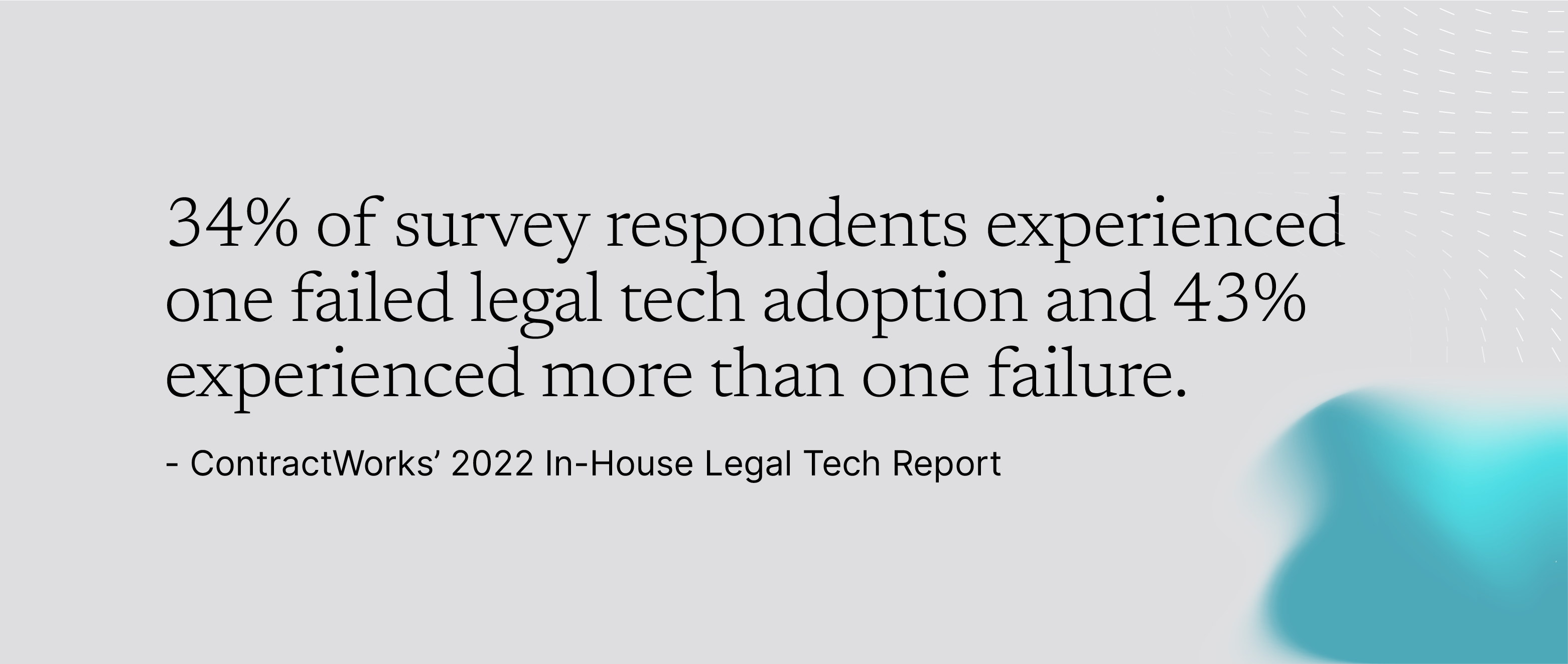There’s a disconnect between the need for legal tech and successfully implementing legal tech in-house.
Most businesses recognize legal tech can help their GCs navigate growing workloads. To that end, legal tech adoption was on the rise before the COVID-19 pandemic. According to a survey by ContractWorks and Censuswide, 57% of respondents said the pandemic sped up their adoption by at least three years. The top solutions respondents acquired were contract management software (37%), matter management software (36%), electronic signatures (36%), and electronic billing software (33%).
Despite the expected benefits of these solutions, private fund managers’ legal tech adoptions can fail to provide a return on investment (ROI). It turns out that experiencing a legal tech failure isn’t uncommon.

What’s going on, and how do private fund managers avoid a similar experience?
4 ways to avoid a failed legal tech adoption
Failed legal tech experiences are not inevitable. Private fund managers can take several steps to increase the likelihood of a successful tech implementation and adoption.
1. Address change management
Firms can’t ignore that a new tech solution will be a significant transition for their staff. In many cases, a new legal tech platform reaches far beyond the in-house legal department. For example, numerous departments and professionals will have a stake in a new contract lifecycle management solution.
The professionals researching and choosing the new tech should understand the ultimate end users’ needs. To that end, private fund managers must first identify the end users of a prospective tech solution and involve them in the procurement process. During these conversations, firms can prepare employees for the upcoming transition and create buy-in throughout the organization.
Next, firms must prepare end users for the implementation process. This will involve open communication about the chosen technology, plenty of training opportunities, an intentionally paced rollout, and ongoing support during the transition.
2. Buy an industry-specific product
It almost goes without saying that the success of a legal tech adoption hinges upon purchasing the product best suited to the firm’s needs. However, given the wealth of legal technology available, it isn’t always simple to find the right product.
Private fund managers must carefully identify their pain points and what problem the product should solve. This is also the time to consider the differences between generic solutions and those created for the private markets. It’s best to find a legal tech platform geared toward private fund managers’ needs.
3. Determine an appropriate implementation plan
Because every software implementation process is unique, private fund managers should define what a successful rollout looks like to them. Without a careful plan, firms risk pushing out a new software solution too fast or rolling it out too slowly.
Firms might want to avoid a “Big Bang” implementation, in which the firm configures the new system before going live and then starts using the new solution all at once. The alternative is a phased approach, in which the firm gradually introduces the solution to end users with updates over time.
A Big Bang implementation might be faster, but it comes with a higher risk of system issues after going live. A phased implementation offers more time to train employees and test and adjust the system, though it can increase implementation costs and delay ROI.
While it’s hard to strike a balance, it’s possible with input from relevant stakeholders. Some solutions might benefit from a phased or combined approach, during which the firm can solicit feedback from end users and adjust the platform, workflows, or next steps.
The transition to new software isn’t entirely within the firm’s control, which is why it’s critical that firms ask how each vendor handles implementation. Would the vendor or the third-party vendor oversee the process? What type of training and ongoing support does the vendor provide? Private fund managers can look for vendors that offer white-glove services versus those that offer the bare minimum of support.
4. Choose the right vendor
Firms should review vendors as closely as they evaluate software solutions. After realizing the challenge of finding vendors with the potential to become long-term partners, Ontra published: Successful Outsourcing: An evaluation guide for selecting B2B vendors.
In it, Ontra lays out concrete steps to find the right legal tech provider:
- Identify the firm’s business needs
- Identify the firm’s criteria for the solution
- Identify the team that will evaluate vendors
- Document a method for evaluating and ranking potential vendors
- Map the decision-making process, including the deadline for the final decision
Ontra also suggests criteria for evaluating B2B vendors, from questions about the vendor’s leadership to its data security and financial durability.
Common causes of failed legal tech adoptions
It helps to know what is most likely to go wrong when striving for a successful legal tech adoption.
Implementation issues
How a firm onboards a new tech solution is critical to its success. In the ContractWorks survey, 27% of respondents said a slow rollout was a barrier to success and 38% said a reason for the failure was implementation taking too long.
These figures should signal to private fund managers that they must orchestrate their implementations as carefully as they choose new solutions. Potential rollout issues also underscore the importance of choosing hands-on vendors. As firms evaluate potential solutions, they can look for vendors that offer white-glove account management and will help them transition to a new solution and workflow.
Insufficient training
Training goes hand-in-hand with a successful implementation. Survey respondents said lack of tech literacy (30%) and lack of time for sufficient training (30%) were barriers to success.
When adopting new solutions, private fund managers should never assume their staff’s knowledge and comfort with technology. Instead, they should focus on providing each employee with the time and opportunity to receive live and recorded training for the new platform.
The wrong tech
The smoothest implementation can’t make up for investing in the wrong solution in the first place. Of the survey respondents, 36% said the tech was too complicated and 33% felt the tech wasn’t the right fit.
Private fund managers could invest in an ill-fitting platform for myriad reasons, including budget constraints, choosing a generic solution, being oversold a solution with unnecessary features, or misunderstanding end users’ needs.
Resistance to change
Private fund employees have a wide range of attitudes toward legal technology, from enthusiastic to skeptical; and some may be particularly resistant to new solutions. ContractWorks found 25% of respondents said employees’ resistance was a barrier to success, and 33% felt resistance to change was a reason for the implementation’s failure.
Private fund managers might not overcome every bit of resistance. However, they can face this challenge head-on by including end users in the procurement process early on and ensuring the firm purchases an industry-specific solution that addresses end users’ most pressing needs.
Lack of support
Successful legal tech adoptions need buy-in at every level of the firm, and end users need management’s support most of all. ContractWorks’ survey respondents felt a lack of support from management was both a barrier to success and a reason for failure.
Management’s support might vary depending on the circumstances but could include bolstering training opportunities, purchasing ongoing support from the vendor, and allowing for delays during the initial rollout.
Consequences of a legal tech implementation gone wrong
Adopting a legal technology solution isn’t an inherently positive proposition. It can go wrong and leave an in-house team worse off than before. With that in mind, private fund managers should seek to understand what can go wrong and use that knowledge to guide their decision-making.
No ROI
Firms might not see ROI on a solution if they choose the wrong tech or handle implementation and change management badly. In the ContractWorks survey, 28% of respondents never saw ROI on their legal tech investment.
In-house legal teams might not cut any costs if they’re unable to use the new solution to create efficiencies, automate manual tasks, or optimize their processes in order to scale. Handling legal tasks in-house might take a similar amount of time and effort, or GCs might have to continue outsourcing work to freelance lawyers or outside counsel.
Damaged employee relationships
Private fund managers shouldn’t underestimate the impact of a failed legal tech adoption on their staff. A negative experience can hurt the employer-employee relationship, lower morale, and contribute to employee turnover.
Of the survey respondents:
- 29% said the failure made them doubt whether their employer knew what was best for the business
- 27% said the failure hurt their confidence
- 27% said they considered or were considering leaving their job
- 25% said it made them resent their job
- 24% said they couldn’t do their job properly
23% left their job
It’s tempting to dismiss these numbers. However, private fund managers often have lean in-house legal departments. Imagine a firm with a four-person team. It hurts the team and firm if one of four employees leaves because of a negative legal tech experience.
Firms can avoid this experience, however, by following the guidance in this article and downloading, Successful Outsourcing: An evaluation guide for selecting B2B vendors.





